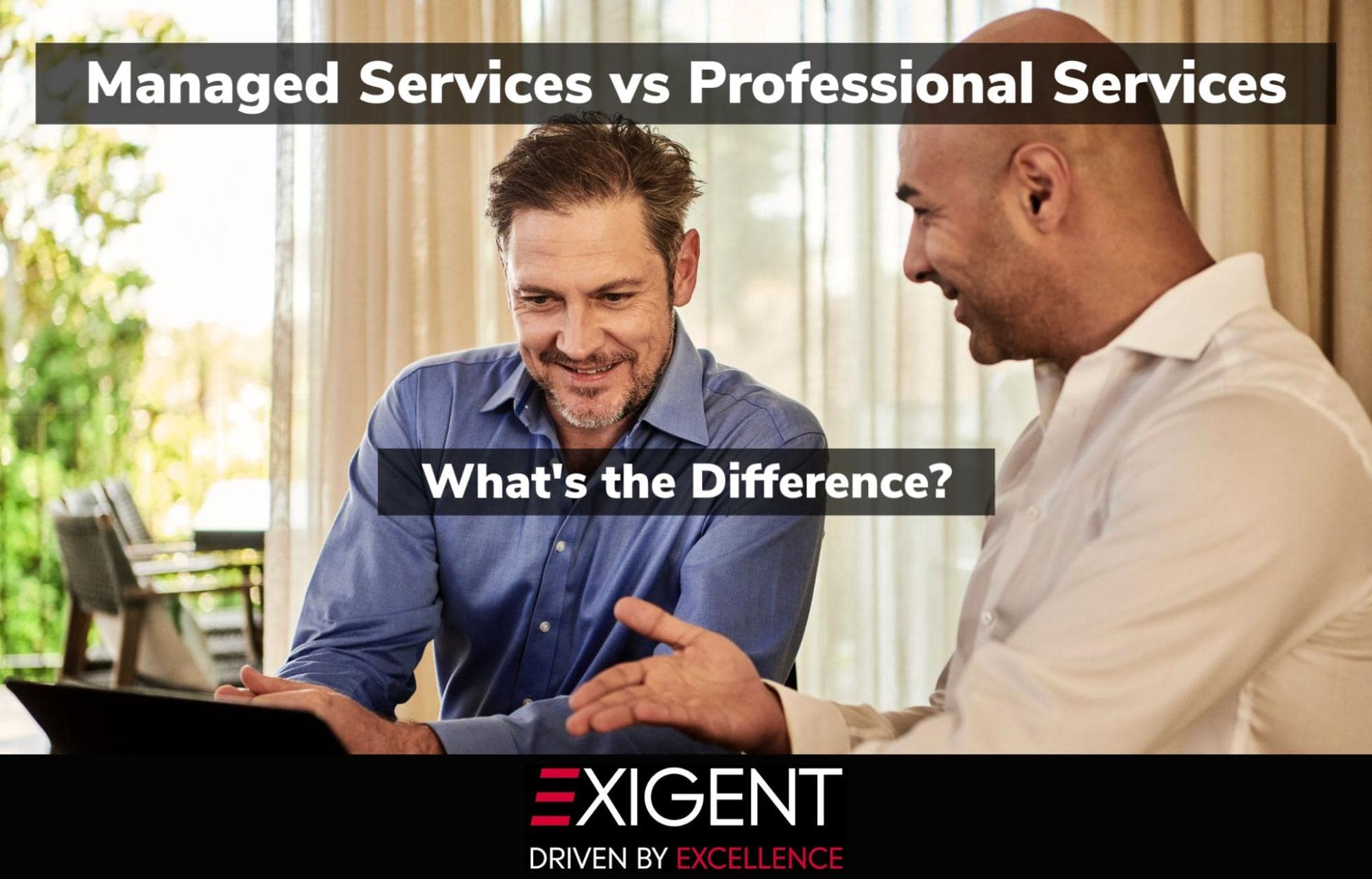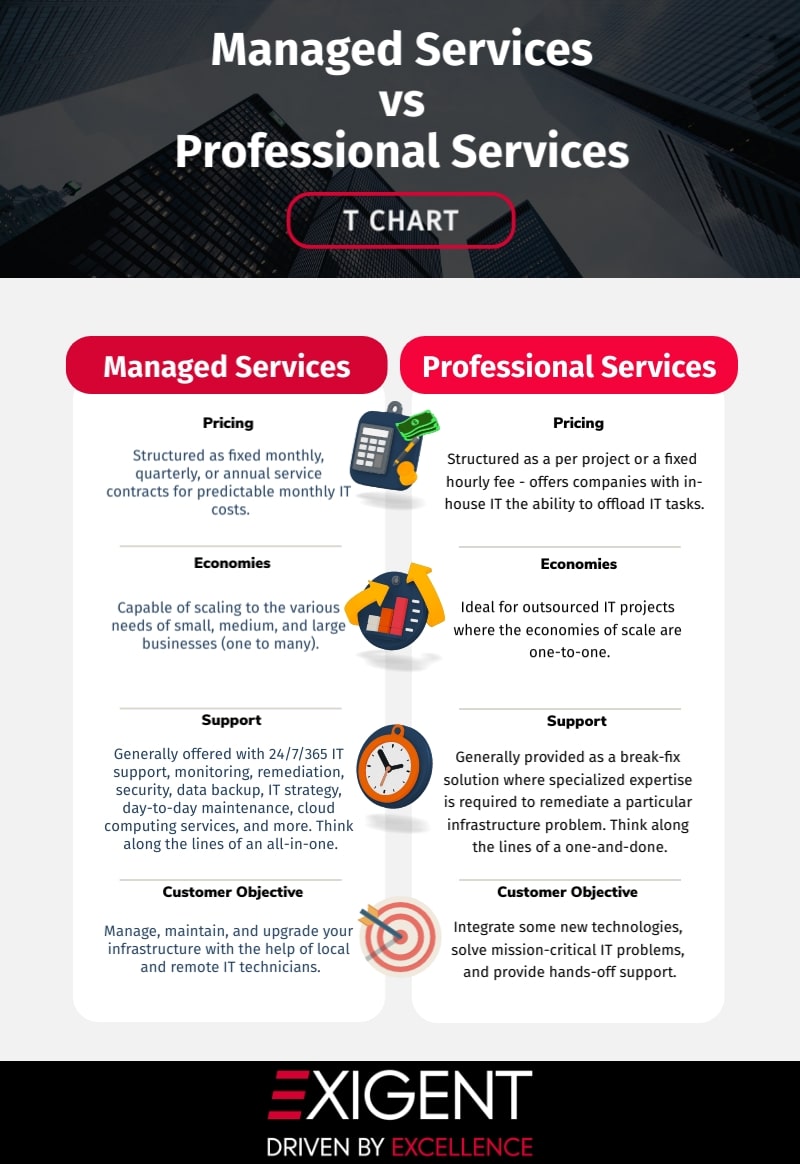
Organizations seeking to outsource their IT often look into managed and professional services.
By sizing up their comparative advantages and differences, organizations can align themselves with a service type that’s best suited to their current and future IT needs.
From helping businesses of all sizes overcome specific challenges to streamlining day-to-day business processes for maximum efficiency and uptime, there are numerous factors to consider between managed service providers (MSPs) and providers of professional services.
In this article, we will break down the core services and differences between managed services vs. professional services. So, with these thoughts in mind, let’s get started.
Managed services provide organizations with long-term outsourced IT management and support services. With managed services, the complete IT lifecycle is maintained by the managed services provider, also known as the MSP.
Unlike a professional service that predominantly offers reactive break-fix services, managed IT services offer a more hands-on, proactive approach to infrastructure and technology management.
According to Statista, the three leading outsourced managed services include cloud computing, IT infrastructure, and managed IT security.
Additional managed services often include:
For small to medium-sized businesses, managed services provide unique advantages, such as the ability to reduce costs while improving IT capabilities and ongoing technology alignment between your infrastructure and business goals.
The Ultimate Disaster Recovery Checklist
|
Professional services are more project-based, like a cloud migration to Microsoft 365 or an office relocation. Generally, they involve a one-time service at an hourly rate and allow companies with an in-house IT team the ability to bypass the implementation adoption process.
Compared to managed services that provide ongoing day to day services and support, professional services are more complementary to an organization and considered more hands-off.
Additional examples of when professional services are used include:
Depending on an organization’s business goals and the scope of work required, managed services or professional services may prove to be a better fit. To help you further differentiate between the two, we’ve included some additional key differences below:
Managed services are outsourced IT support services whereas professional services can be a mix between in-house and outsourced. In many cases, professional services are used to supplement or offload an in-house IT team, automate repetitive tasks, or manage one-off IT projects.
Under professional services, businesses identify and report their problems to providers. With managed services, the MSP is generally responsible for detecting and remediating problems. While an MSP provides 24/7 proactive monitoring, professional services are reactive.
This becomes an issue when you consider how most data breaches aren’t detected and contained for an average of 287 days.
Since professional services are often in-house teams, they only remediate IT issues during normal business hours whereas managed services provide proactive and ongoing support, often 24/7/365, regardless of the hour.
Organizations without an effective in-house IT team (regardless of their size) often consider managed services as they provide easy scalability and the ability to cover all their organization’s current and future infrastructure needs.
Businesses that are seeking business-specific services, such as a digital transformation or compliance consulting, lean toward professional services.
Depending on your organization’s size, structure, processes, industry, needs, and location, managed or professional services may prove to be a better fit. If you’re still not sure, you can learn more about our managed services to see if they’re a good fit for you.

Disclaimer: Exigent Technologies may not support all of the services shown above.
| Interested in learning more about managed and professional IT services? Check out these blogs: |
As you’ve learned in this article, there’s a lot that goes into deciding whether managed or professional services are the best fit for your business.
Among the most important factors to consider is which service will best meet your needs at a rate and service level coverage that’s ideal for your business. That’s why if you haven’t already asked yourself which type of services and support you need, now is the time to get specific.
Regardless of the route you choose, you can rest assured knowing that the needs of your business will be met. Among the benefits that we offer with our IT support services include:
Still not sure whether managed services vs. professional services are right for you? Contact us today for expert insights and more information from our knowledgeable technicians.
Daniel Haurey Jr. is the president and founder of managed IT services provider Exigent Technologies, which he founded in 1997. Under his leadership, the MSP has earned accolades ranging from Channel Futures MSP 501 to being named SonicWall’s 2024 MSP Growth Partner of the Year. Dan is a true entrepreneur, dedicated to growing, investing in, and mentoring small businesses. You can find him on LinkedIn, where he regularly posts about technology, business, leadership, and community.